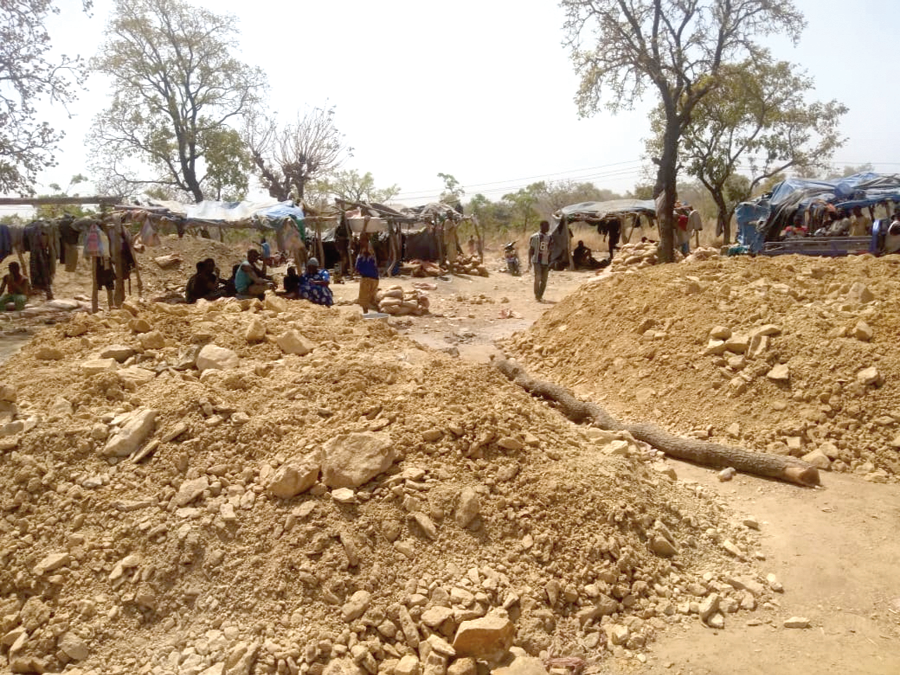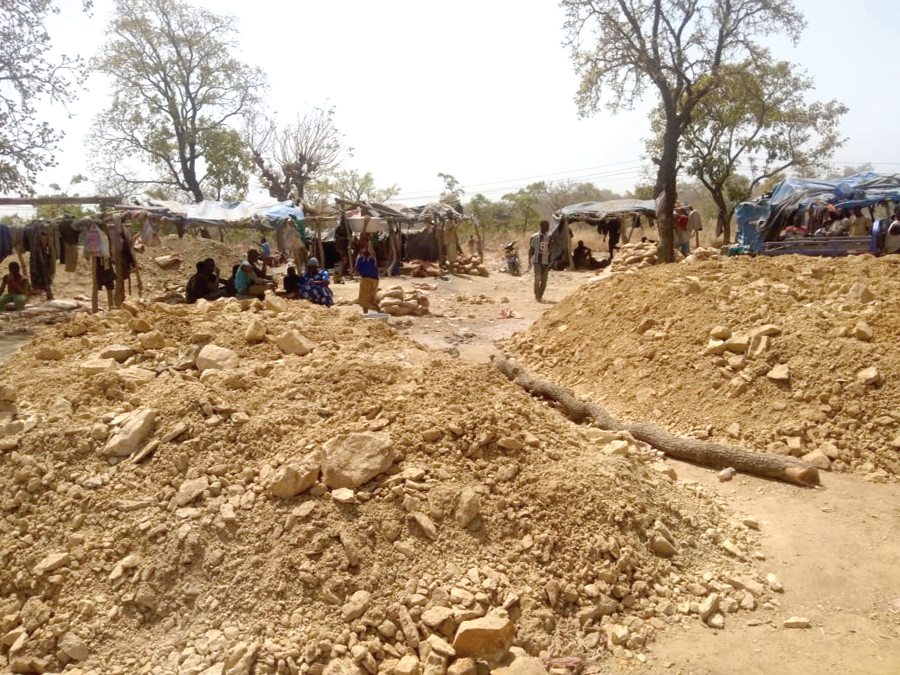
Stripping northern Ghana naked - Illegal mining wreaking havoc on fragile vegetation cover
The mention of illegal mining, popularly known as ‘galamsey’, takes everybody’s attention to the southern part of the country.
But in many parts of Northern Ghana, galamsey is deep rooted and wreaking havoc to swathes of land and forest reserves. Unlike the south where water bodies are being polluted with impunity, the fragile vegetative cover in the north appears to be bearing the brunt of the menace.
Large tracts of farmland and forest reserves in the Upper West, Upper East, Savannah and the North East regions have been destroyed and deep pits left behind that serve as death traps to residents in the mining communities.
Advertisement
For the past seven months, the Daily Graphic’s visits to a number of mining areas in the five regions have revealed that the illegal miners who are said to comprise both locals and foreigners, have been engaging in the activities with impunity and calling the bluff of leaders in the communities and environmental activists.
The areas include Bawku West, Talensi, Wa West, Wa East, Bole and Mamprugu/Moaduri districts as well as the Kasena-Nankana, Jirapa and Sissala East municipalities, all in the five regions of the north.
While a number of illegal miners have lost their lives in abandoned pits, the menace has also increased insecurity issues due to the influx of foreign nationals such as Burkinabes, Ivorians, Togolese and Chinese in many mining areas.
Forest invasion
In the Sissala East and Kasena-Nankana municipalities, the illegal miners have invaded forest reserves in the Pudo, Banu, Wuru and Kayoro communities.
Along the western enclave of the Ghana-Burkina Faso border, they have caused massive destruction to the environment, causing a major threat to wildlife in the western corridor, a habitat that hosts the Mole National Park in Ghana and the Nazenga Game Reserve in Burkina Faso.
The corridor also facilitates the seasonal movement of wildlife between the two wildlife parks in West Africa.
When the Daily Graphic visited the area recently, it observed that the illegal miners were busily mining deep inside the forests.
They had cut down a large number of trees and cleared pathways through the forest to facilitate their mining activities. At the Pudo forest for instance, a large tract of land had been laid bare.
With the land progressively being deprived of vegetation that protects it against the vagaries of the weather, one can imagine the level of erosion that will take place when it rains.
The Sissili River, which is the main source of water for farming and for drinking for both humans and wildlife, is also under severe threat of drying up as it has become heavily polluted through the activities of the miners.
An Environmental Activist, Seidu Jeremiah, who has been leading a crusade against the destruction of the forest reserves in the area, said the illegal miners had pitched camp deep in the reserves and were mining with impunity.
“The Forestry Commission and all bodies in charge of protecting the reserves are helpless because most of the influential people in the communities are deeply involved, so it is very difficult to clamp down on the menace,” he said.
Insecurity
At the Dorimon and Manwe communities in the Wa West and Wa East districts, illegal mining has become the nectar that has attracted a beehive of activities in the hitherto quiet villages.
The miners have dug deep pits and cleared large tracts of both forest and off-forest reserves to prospect for gold. Aside from that, migrants have also taken over the entire communities, raising concerns of insecurity.
In November 2021, a team of security operatives carried out an exercise and rounded up 14 foreign nationals suspected to be engaged in illegal mining. They also destroyed their equipment and places of residence but the miners have since returned to the sites.
Concerns
Some residents of the area who spoke to the Daily Graphic raised concerns about the negative impact of galamsey on their communities.
A 50-year-old man, Salifu Rahim, said “previously there were no armed robbery incidents here but since they started galamsey here we record robbery cases almost every day, so now we are living in fear”.
Another resident, Charles Banawine, indicated that a number of illustrious young men had lost their lives through the galamsey activities in the area, a situation which was very worrying.
Surface mining

Unlike other areas where deep gullies and pits have been created, at Zebila and its environs in the Bawku West District, the illegal miners were engaged in surface mining.
They are busily briskly removing the top soil and using metal detectors to prospect for the gold, causing massive devastation to the land.
Both residents and local authorities appear to be helpless about the situation, as the miners who are mostly Burkinabes and Togolese advance their activities towards homes and farmlands.
The District Chief Executive for Bawku West, Tahiru Issahaku Ahmed, described the situation as a serious threat and said the District Security Council (DISEC) was engaging the various stakeholders to help fight the menace.
Aside from that he indicated that “the assembly is also engaging the illegal miners who are Ghanaians to form community mining schemes to ensure proper mining.”
Collapsing pits

In September this year, five people who were said to be engaged in illegal mining were trapped to death in a pit at Nangruma in the Mamprugu/Moaduri District.
They were said to be prospecting for gold in an abandoned pit, an area some Chinese nationals are said to have earlier mined and left uncovered.
Following the incident, the North East Regional Security Council (REGSEC) deployed a special taskforce to flush out all illegal miners from the area.
To stop the illegal mining activities from continuing to destroy the environment and resulting in the loss of lives, the REGSEC has also started engaging all illegal miners and residents of the mining communities on the need to form cooperatives to secure permits from the Minerals Commission for community mining.
In an interview, the North East Regional Minister, Yidana Zakaria, said “due to the nature of the pits created, it would need a national effort to be able to cover up the area because the assembly didn’t have the resources”.
Mining industry

Unlike the southern part of the country, Northern Ghana has few companies engaging in both small and large scale legitimate mining activities.
They are Cardinal Resources Ltd and Earl International Gold (GH) Ltd, which are currently preparing to commence large scale mining, as well as Azuma Resources Ltd, which has also began prospecting for gold in parts of the Upper West and Savannah regions.
Aside from that, communities such as Dakurpe and Banda Nkwanta, all in the Bole District, are also engaging in a Community Mining Scheme (CMS).
During a recent tour of the Northern part of the country, the Minister of Lands and Natural Resources, Samuel Abu Jinapor, expressed the government’s commitment to take proactive steps to regulate the emerging mining industry in the north.
The move, he said, was to ensure that the gold deposits in the area were sustainably harnessed for national development.
Climate change
Activities of illegal mining are having a toll on the vegetative cover in Northern Ghana, as the few forest reserves and economic trees such as shea, which constitutes about 90 per cent of the ecology is being destroyed.
With the rampant destruction of the vegetation through illegal mining, many have raised concerns that if the menace is not immediately checked by authorities, the area would soon lose its already depleted vegetation, worsening the climate change situation.
The Forestry Commission estimates that about 6.6 million hectares of Ghana’s 8.2 hectares of forest trees have been depleted over the years through indiscriminate human activities.
Currently, the country’s remaining forest cover of 1.6 million hectares is threatened by illegal mining, lumbering and other human activities.
To protect the already depleted ecosystem in the north, there is, therefore, the need for the government to step up stringent measures to clamp down on the activities in the area just as it is paying attention to the situation in the south.
Writer’s email: mohammed.fugu
@graphic.com.gh



